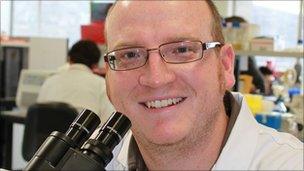Bangor University's grant for diabetes research
- Published

With more people with the disease, Dr Mulley said all avenues have to be explored
Researchers at Bangor University are to investigate a previously unchecked gene which could aid treatment of diabetes.
The plan is to try to understand more about how the Pdx2 gene works to discover if it can help treat people with type 2 diabetes.
More than 153,000 people have been diagnosed with diabetes in Wales with type 2 making up 90% of cases.
Diabetes UK is funding the study as part of £960,000 research across Wales.
The charity awarded a £14,500 grant to Dr John Mulley to research the processes which activate the Pdx2 gene because it is similar to another gene called Pdx1.
The Pdx1 gene has previously been shown to have a role in making insulin-producing cells in humans.
Dr Mulley's work could identify new genetic pathways for insulin regulation or the production of insulin-producing cells.
These could then be adapted for use in humans and for future diabetes treatments.
"With diabetes causes on the increase, it's vital that we explore as many avenues as possible, so that we can understand the disease and the potential opportunities to develop new treatments," Dr Mulley added.
Type 2 diabetes develops when the body can still make some insulin, but not enough, or when the insulin that is produced does not work properly, and glucose builds up in the blood.
In accounts for between 85 and 90% of all people with diabetes.
In most cases the condition is linked to being overweight.
It can go undetected for up to 10 years which means around half of sufferers show signs of complications by the time they are diagnosed.
Dr Victoria King, Diabetes UK head of research, said the search for new treatments was important.
"Once the insulin-producing beta cells have been destroyed in diabetes they have a limited, or almost non-existent, capacity to regenerate," she said.
"So working out how diverse organisms manage to regenerate insulin-producing cells, or regulate their insulin and glucose levels, can provide information that we can harness to develop ways to treat diabetes," she added.
- Published13 August 2010